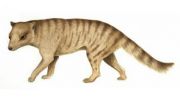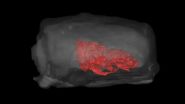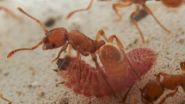(Press-News.org) In a new article published online today in the journal Evolution, Medicine, and Public Health, Professor David Haig argues that infants that wake frequently at night to breastfeed are delaying the resumption of the mother's ovulation and therefore preventing the birth of a sibling with whom they would have to compete.
It has already been documented that smaller gaps between the births of siblings are associated with increased mortality of infants and toddlers, especially in environments where resources are scarce and where infectious disease rates are high, and Professor Haig believes that the benefits of delay are such that the selective forces are strong enough to have engendered a significant evolutionary response.
Professor Haig says, "The duration of postpartum amenorrhea is a major determinant of interbirth internals (IBI) in natural fertility populations with more frequent and more intense nursing, especially at night, associated with prolonged infertility. Natural selection will have preserved suckling and sleeping behaviours of infants that suppress ovarian function in mothers because infants have benefited from delay of the next birth. Maximal night waking can be conjectured to overlap with the greatest benefits of contraceptive suckling."
Haig also points out that while less frequent night waking in formula-fed infants is usually explained by the fact that formula is harder to digest, and therefore more soporific, than breast milk, infants who were breastfed but were not nursed during the night slept longer than breastfed infants who were nursed at night.
Attention is also drawn to the sleep of infants with Prader-Willi syndrome (PWS) – who often have a weak suck and sleep a lot – and infants with Angelman syndrome (AS) – who wake frequently at night. These syndromes are both caused by deletion of a cluster of imprinted genes at chromosome 15q13 but differ in the parental origin of the deletion. These phenotypes suggest that imprinted genes of paternal and maternal origin have contrasting effects on sleep in infants without deletions, with genes of paternal origin promoting suckling and waking. Small-scale behavioural interventions in which parents were instructed not to respond to night waking by children with AS have resulted in dramatic improvements in sleep quality.
Professor Haig writes: "In the developed world, many of the health advantages of prolonged IBIs have diminished and more reliable forms of contraception have replaced lactational amenorrhea. Therefore, the selective forces responsible for these behaviours have been attenuated but the behaviours remain part of our biological heritage. One should question whether modern sleep practices have had unintended consequences for child health but it would be irresponsible to recommend changes to these practices, solely on the basis of mismatch, without epidemiological evidence of harm. Mismatch is a medical problem only if it causes pathology.
"Identification of the 'environment of evolutionary adaptedness' with the optimal environment for wellbeing conflates questions of fitness and health. What was best for one was not always best for the other. Genetic conflicts within the family are part of our biological heritage, as are love and care for our children."
The journal has also published five articles and commentaries that respond to Professor Haig's paper from varying perspectives, along with a further reply to the responses by the author.
INFORMATION:
For further information, or to request a copy of the paper and/or related commentaries, contact:
Kirsty Doole, Publicity Manager, Oxford Journals
kirsty.doole@oup.com | +44 (0) 1865 355439 | +44 (0) 7557 163 098
Breastfeeding and infant sleep
Are babies who wake to breastfeed at night trying to delay the birth of a sibling?
2014-04-10
ELSE PRESS RELEASES FROM THIS DATE:
Extinct carnivorous marsupial may have hunted prey larger than itself
2014-04-10
The reconstruction of an extinct meat-eating marsupial's skull, Nimbacinus dicksoni, suggests that it may have had the ability to hunt vertebrate prey exceeding its own body size, according to results published April 9, 2014, in the open access journal PLOS ONE by Marie Attard from the University of New England together with colleagues from the University of New South Wales.
Nimbacinus dicksoni is a member of an extinct family of Australian and New Guinean marsupial carnivores, Thylacinidae. Aside from one recently extinct species, the majority of information known about ...
Rare leafcutter bee fossils reveal Ice Age environment at the La Brea Tar Pits
2014-04-10
VIDEO:
This is a spinning animation of fossil of male pupa and its position within the nest cell.
Click here for more information.
LOS ANGELES — The La Brea Tar Pits, the world's richest and most important Ice Age fossil locality, is most celebrated for it collection of saber-toothed cats and mammoths. The site's lesser known, but equally vast insect collection, is also of great significance. Recent examination of fossil leafcutter bee nest cells containing pupae, led by Anna R. ...
Spironolactone not reduce primary outcome, did reduce hospitalizations for heart failure
2014-04-10
Boston, MA – Findings from the Treatment of Preserved Cardiac Function Heart Failure with an Aldosterone Antagonist (TOPCAT) trial, have revealed that adding the medication known as spironolactone (Aldactone) to existing therapy did not significantly reduce the composite time to either death from cardiovascular causes, surviving a cardiac arrest, or hospitaliization to manage heart failure in patients with heart failure and a preserved ejection fraction in a study funded by the National Heart, Lung and Blood Institute, National Institutes of Health.
The study will be ...
Study confirms impact of clinician-patient relationship on health outcomes
2014-04-10
A meta-analysis of studies that investigated measures designed to improve health professionals' interactions with patients confirms that such efforts can produce health effects just as beneficial as taking a daily aspirin to prevent heart attack. In contrast to previous such reviews, the current report from the Empathy and Relational Science Program at Massachusetts General Hospital (MGH) only included randomized, controlled trials with more reliable results than those included in earlier studies. While it has long been believed that a good patient-clinician relationship ...
Water users can reduce the risk of spreading invasive species
2014-04-10
Foreign species that are devastating water ecosystems could be "hitchhiking" around Britain on canoeists' and anglers' kit, according to a new study.
Invaders like the killer shrimp, zebra mussel and American signal crayfish have already caused extensive environmental damage and millions of pounds of economic costs.
The new research, led by the University of Leeds and the Centre for Environment Fisheries and Aquaculture Science (Cefas), found that the cleaning habits of anglers and canoeists could be a key part of the problem.
The study, based on a survey of more ...
Butterfly larvae mimic queen ant to avoid detection
2014-04-10
Parasitic butterfly larvae may mimic ants' acoustic signals to aid in the infiltration of their host colonies, according to results published April 9, 2014, in the open access journal PLOS ONE by Marco Sala from University of Turin, Italy, and colleagues.
Ants aggressively defend their colonies and nests, so successfully that these locations make a perfect shelter for another similar species to live in. However, ants have evolved a complex set of signals that allow colony members to distinguish between residents and intruders. The social parasitic Maculinea butterfly uses ...
Security barriers in US/Mexico national parks affect movement of animals
2014-04-10
Because international boundaries can be focal points for trade, illegal activity and development, national parks in their vicinity can be vulnerable to pollution, erosion and hunting as well as smuggling of people and drugs.
There is an increasing trend towards the erection of barriers to counter this illegal activity, which may reduce environmental impacts too. However barriers may restrict native species' territory, causing an environmental impact of their own.
Bristol PhD student, Jamie McCallum, now of the Zoological Society of London (ZSL), and colleagues from ...
Genetic defect may confer resistance to certain viral infections
2014-04-10
WHAT:
A National Institutes of Health (NIH) study reports that a rare genetic disease, while depleting patients of infection-fighting antibodies, may actually protect them from certain severe or recurrent viral infections. Researchers found that HIV and influenza viruses replicate in the cells of people with congenital disorder of glycosylation type IIb (CDG-IIb) at a much lower rate than in healthy donor cells, creating fewer and less infectious viruses. The study, published in The New England Journal of Medicine, was led by Sergio Rosenzweig, M.D., Ph.D., director of ...
Consuming a high-fat diet is associated with increased risk of certain types of BC
2014-04-09
High total and saturated fat intake were associated with greater risk of estrogen receptor- and progesterone receptor-positive (ER+PR+) breast cancer (BC), and human epidermal growth factor 2 receptor-negative (HER2-) disease, according to a new study published April 9 in the Journal of the National Cancer Institute.
Published data from epidemiological and case-control studies on the association between high fat intake and BC risk have been conflicting, which may be attributable to difficulties obtaining accurate information on fat intake and because of limited heterogeneity ...
Older people with faster decline in memory/thinking skills may have lower risk of cancer death
2014-04-09
MINNEAPOLIS – Older people who are starting to have memory and thinking problems, but do not yet have dementia may have a lower risk of dying from cancer than people who have no memory and thinking problems, according to a study published in the April 9, 2014, online issue of Neurology®, the medical journal of the American Academy of Neurology.
"Studies have shown that people with Alzheimer's disease are less likely to develop cancer, but we don't know the reason for that link," said study author Julián Benito-León, MD, PhD, of University Hospital 12 of October in Madrid, ...
LAST 30 PRESS RELEASES:
New “lock-and-key” chemistry
Benzodiazepine use declines across the U.S., led by reductions in older adults
How recycled sewage could make the moon or Mars suitable for growing crops
Don’t Panic: ‘Humanity’s Last Exam’ has begun
A robust new telecom qubit in silicon
Vertebrate paleontology has a numbers problem. Computer vision can help
Reinforced enzyme expression drives high production of durable lactate-based polyester
In Rett syndrome, leaky brain blood vessels traced to microRNA
Scientists sharpen genetic maps to help pinpoint DNA changes that influence human health traits and disease risk
AI, monkey brains, and the virtue of small thinking
Firearm mortality and equitable access to trauma care in Chicago
Worldwide radiation dose in coronary artery disease diagnostic imaging
Heat and pregnancy
Superagers’ brains have a ‘resilience signature,’ and it’s all about neuron growth
New research sheds light on why eczema so often begins in childhood
Small models, big insights into vision
Finding new ways to kill bacteria
An endangered natural pharmacy hidden in coral reefs
The Frontiers of Knowledge Award goes to Charles Manski for incorporating uncertainty into economic research and its application to public policy analysis
Walter Koroshetz joins Dana Foundation as senior advisor
Next-generation CAR-T designs that could transform cancer treatment
As health care goes digital, patients are being left behind
A clinicopathologic analysis of 740 endometrial polyps: risk of premalignant changes and malignancy
Gibson Oncology, NIH to begin Phase 2 trials of LMP744 for treatment of first-time recurrent glioblastoma
Researchers develop a high-efficiency photocatalyst using iron instead of rare metals
Study finds no evidence of persistent tick-borne infection in people who link chronic illness to ticks
New system tracks blockchain money laundering faster and more accurately
In vitro antibacterial activity of crude extracts from Tithonia diversifolia (asteraceae) and Solanum torvum (solanaceae) against selected shigella species
Qiliang (Andy) Ding, PhD, named recipient of the 2026 ACMG Foundation Rising Scholar Trainee Award
Heat-free gas sensing: LED-driven electronic nose technology enhances multi-gas detection
[Press-News.org] Breastfeeding and infant sleepAre babies who wake to breastfeed at night trying to delay the birth of a sibling?



